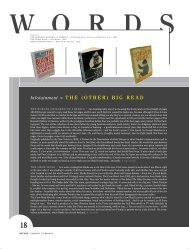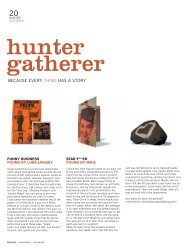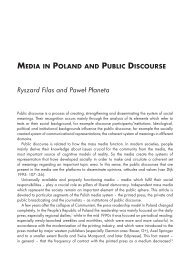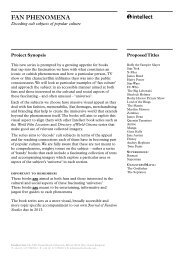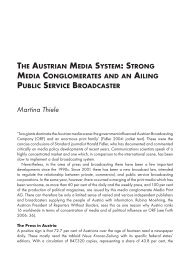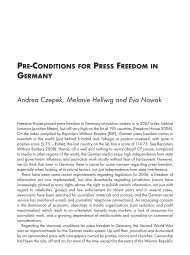Anthem - Intellect
Anthem - Intellect
Anthem - Intellect
You also want an ePaper? Increase the reach of your titles
YUMPU automatically turns print PDFs into web optimized ePapers that Google loves.
<strong>Anthem</strong><br />
When such tones are suddenly heard in Beethoven’s Ninth, they immediately ask<br />
for some kind of justification and interpretation, and critics have generally baulked at<br />
their alien character in relation to what has come before. One example of this alienated<br />
reception is when for instance Walter Riezler hears the Turkish music ‘like a march from<br />
another world, war-like, but first almost incorporeal, as if it, hardly anymore audible to<br />
us, emerged from the most distant far of the universe’. 391 However, the main provocation<br />
of these sounds does not lie in the sounds as such, but in their structural position within<br />
the work as a whole. A contrasting element of otherness could well be accepted if it was<br />
in some way contained and made intelligible within a totalising meaningful narrative,<br />
but the first appearance of these noisy and unsophisticated rhythms is combined with<br />
angelic words that commentators have found inappropriate for it, creating an ‘almost<br />
perverse’ effect. And when it then returns in the concluding orgiastic feast at the very<br />
end of the work, this also has caused trouble for those who found it much too unpolished<br />
and uncivilised to live up to their ideas of heavenly joy in an Elysian paradise.<br />
As Cook mentions, interpreters have used shifting strategies to deal with these<br />
apparent anomalies. For instance, the ‘Turkish’ music could either be understood to<br />
denote the revolutionary mass activity of the common people, or to signify some kind<br />
of eastern ethnic otherness in relation to the basic western classical idiom of the work<br />
as a whole, with radical effects on how to understand Beethoven’s ‘message’—if there is<br />
any to be understood, a fact which Cook’s deconstructive analysis seems to question.<br />
One interpreter has linked this issue to the European unification project. In a<br />
series of articles from 2006 and 2007, Slavoj Žižek saw the negative results of the EU<br />
constitutional referendums as expressions of political populism that refuses complexity<br />
and constructs simple bipolarities of us and them, where the enemies comprise Brussels<br />
bureaucracy as well as illegal immigrants. He argued that instead of dismissing these<br />
sceptical French and Dutch opinions as misled, one should dare to abandon the blind<br />
faith in Europe’s technological modernity and cultural traditions in order instead<br />
to dispel the fetish of scientific-technological progress AND to get rid<br />
of relying on the superiority of its cultural heritage. […] It is time for<br />
us, citizens of Europe, to become aware that we have to make a properly<br />
POLITICAL decision of what we want. No enlightened administrator<br />
will do the job for us. 392<br />
This was the context in which Žižek, leaning on Cook, exemplified with the European<br />
anthem, ‘a true “empty signifier” that can stand for anything’ and therefore can<br />
ideologically serve as a musical basis for forgetting all existing inequalities in an<br />
ecstatic moment of unification. Žižek’s primarily focuses on precisely the problem<br />
with the ‘Turkish’ march:<br />
169




